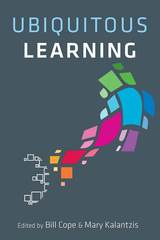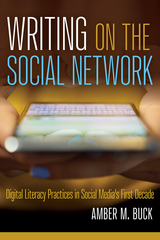
This collection seeks to define the emerging field of "ubiquitous learning," an educational paradigm made possible in part by the omnipresence of digital media, supporting new modes of knowledge creation, communication, and access. As new media empower practically anyone to produce and disseminate knowledge, learning can now occur at any time and any place. The essays in this volume present key concepts, contextual factors, and current practices in this new field.
Contributors are Simon J. Appleford, Patrick Berry, Jack Brighton, Bertram C. Bruce, Amber Buck, Nicholas C. Burbules, Orville Vernon Burton, Timothy Cash, Bill Cope, Alan Craig, Lisa Bouillion Diaz, Elizabeth M. Delacruz, Steve Downey, Guy Garnett, Steven E. Gump, Gail E. Hawisher, Caroline Haythornthwaite, Cory Holding, Wenhao David Huang, Eric Jakobsson, Tristan E. Johnson, Mary Kalantzis, Samuel Kamin, Karrie G. Karahalios, Joycelyn Landrum-Brown, Hannah Lee, Faye L. Lesht, Maria Lovett, Cheryl McFadden, Robert E. McGrath, James D. Myers, Christa Olson, James Onderdonk, Michael A. Peters, Evangeline S. Pianfetti, Paul Prior, Fazal Rizvi, Mei-Li Shih, Janine Solberg, Joseph Squier, Kona Taylor, Sharon Tettegah, Michael Twidale, Edee Norman Wiziecki, and Hanna Zhong.

Through qualitative case study research, Buck explores how literate activities on social network sites coalesced around three areas crucial for writing in digital environments: (1) a heightened awareness of audience and an ability to tailor messages to specific audiences; (2) an understanding of how personal data is collected and circulated in online spaces; and (3) a means through which to use the first two skills for self-promotion and self-presentation in both personal and professional settings. She identifies several distinct literacy practices and strategies used by participants to communicate effectively and addresses how these strategies can help writing researchers and internet scholars understand the impact of social media’s first decade and can inform the ways they will research and understand social media’s second decade.
Social media platforms represent important locations where the different influences on writing become visible. Writing on the Social Network is a close study of the rich literate practices individuals have engaged in on social network sites over the last ten years that allows for a better understanding of the role social media plays in shaping digital literacy.
READERS
Browse our collection.
PUBLISHERS
See BiblioVault's publisher services.
STUDENT SERVICES
Files for college accessibility offices.
UChicago Accessibility Resources
home | accessibility | search | about | contact us
BiblioVault ® 2001 - 2024
The University of Chicago Press









